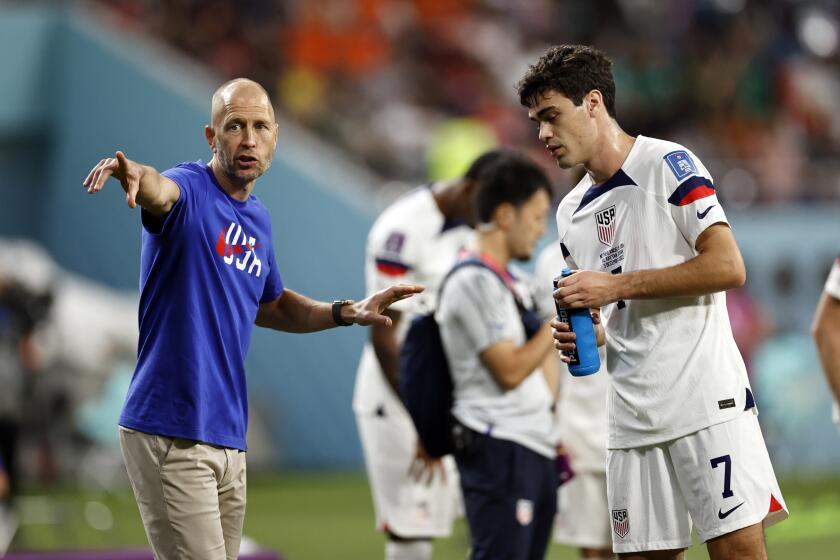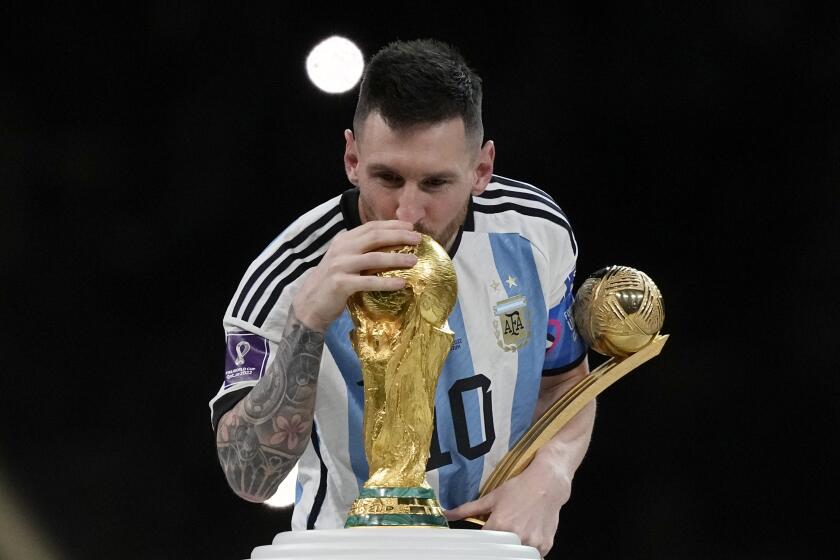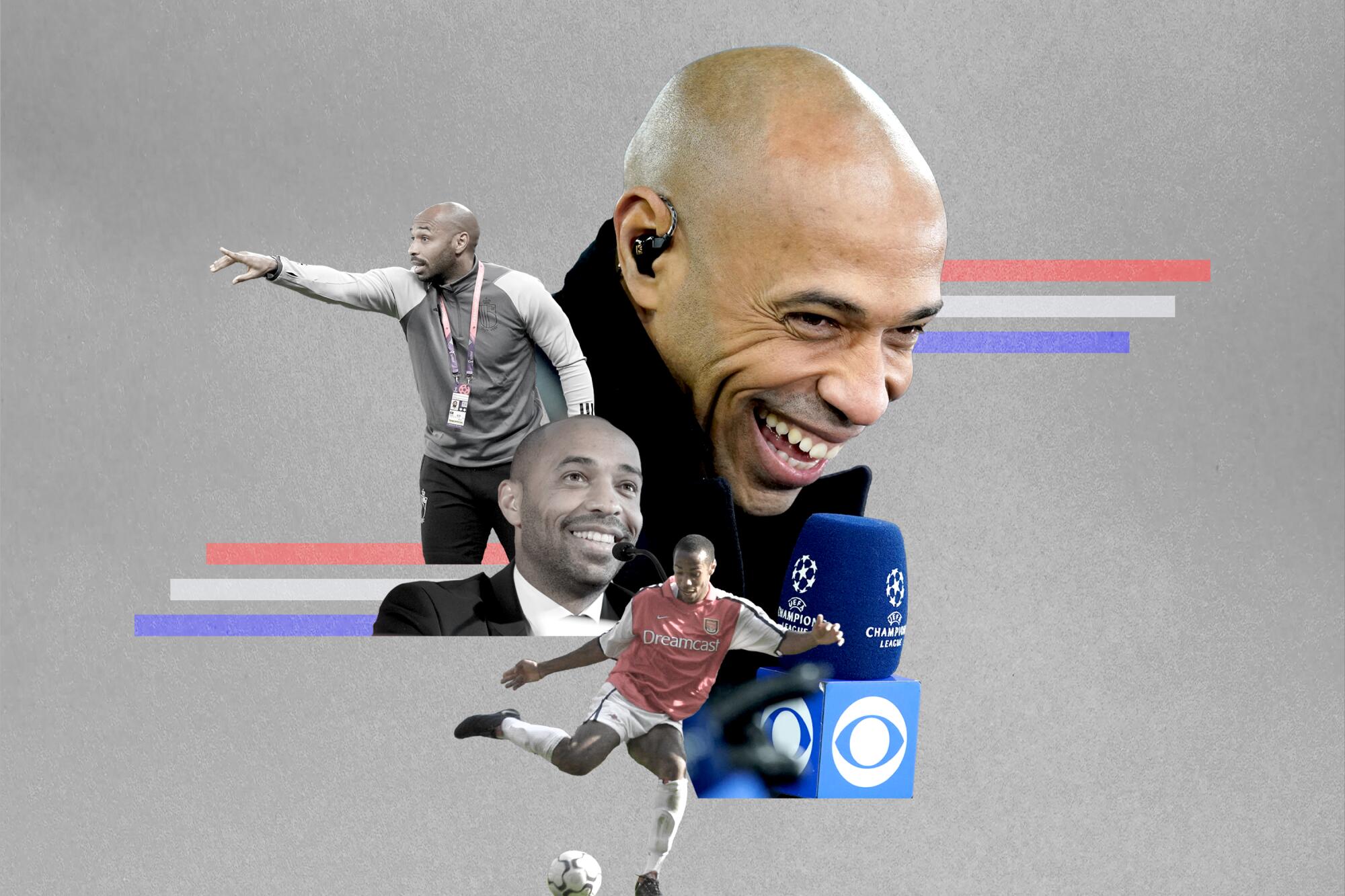
- Share via
LONDON — He was alone, two hours before showtime, the night Manchester City and Real Madrid clashed in the Champions League semifinal. He sat there, anxious — without the shield of the working man’s crimson or the blazing No. 14 kit that made us compare him to the Almighty. But, Thierry Henry wasn’t suiting up tonight. Not to play, anyway. Perhaps that’s why he couldn’t stop pacing the halls of the glossy studios in Stockley Park. Thierry needed to be game-ready, to look at tactics and clear his mind before the lights pop and cameras zoom in on him. Only, for someone billed as the top man around town, it looked like he was suffocating.
Thierry retreated to his green room. He paced around the box. He tugged on his collar, furiously pulling on a delicate almond tie. Before long, he jumped from the chair, turned to me and declared that it was time to get out of his suit.
He asked if I, or the press agent to the right of me, minded. And, before either of us could make sense of what he meant, poof! Thierry sped behind one door of a chifferobe, and in the blink of an eye, he was nearly nude. Both of his arms were fully tattooed, sleeves stretching into his armpits. On his back was London’s skyline, to match the silhouette of New York (his favorite city) on his left arm. The face of one of his children was on his right forearm, the circumference of an office clock. “Vulnerability” was written on one leg, 0:00 on his wrist (to remind him to always reset, even in his darkest moments). It wasn’t just that the 45-year-old looked like he could play again now if he had to, he was showing off. I would say he looked like he’d been lifting.
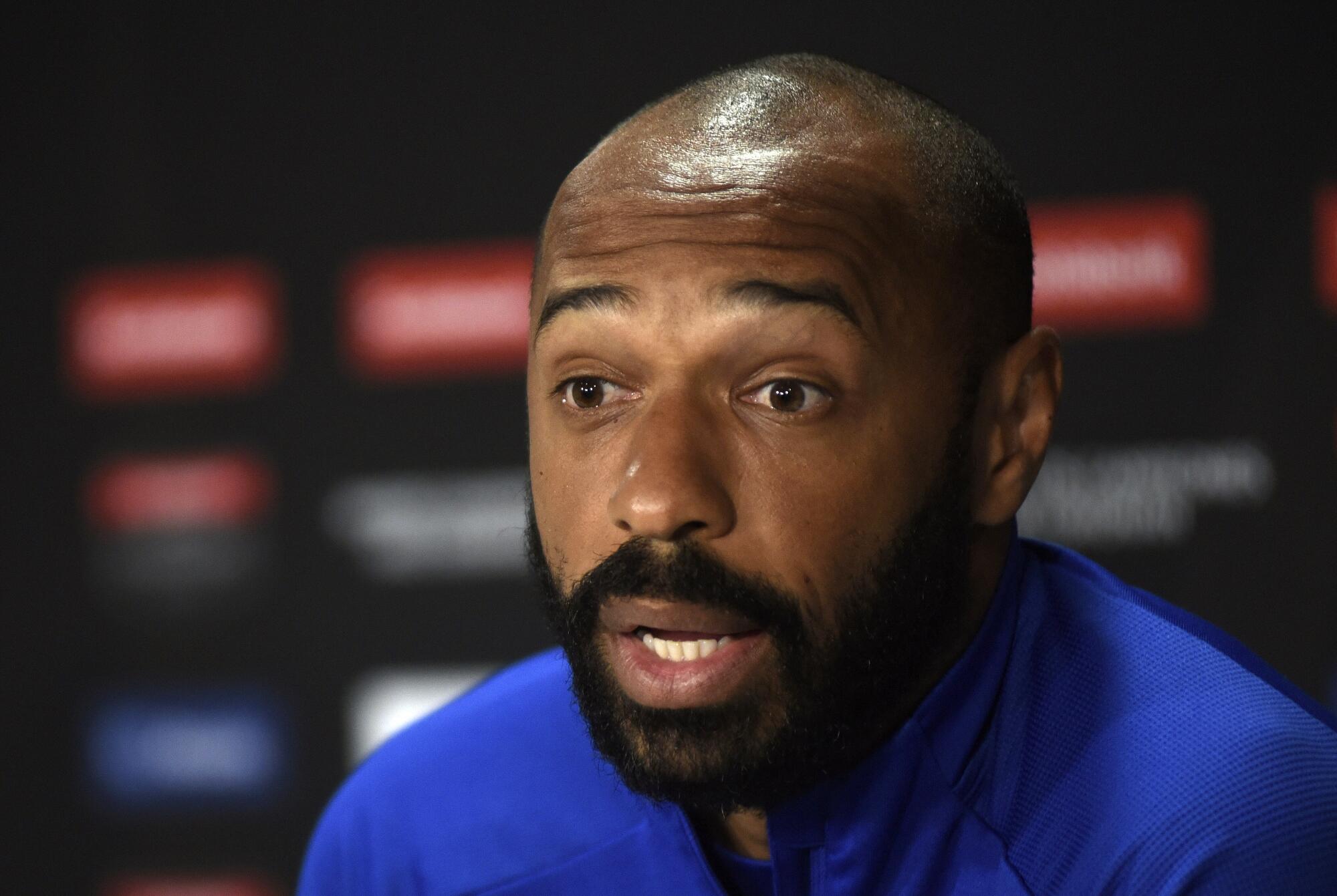
Not nearly as quickly, he selected his loungewear, settling, eventually, on a tracksuit and skin-tight black shirt. He dropped back into a chair and waited for someone to fetch him a cup of coffee. He was clearly jittery. In the decade since he left the game, after nearly 600 combined appearances for Monaco, Juventus, Arsenal, Barcelona and the New York Red Bulls, you can forgive him if his mind can go anywhere but back to the grass.
A lot of his days have looked like this, being pulled in whichever direction the telly needs him. One night he’s shuffled around the cerulean CBS set as the shining star of its Champions League coverage next to Jamie Carragher, Micah Richards and Kate Abdo. The next he’s calling a game in France or flying to Italy to hug the pitch lines with old foes as he studies the game.
In 30 years of English football in the Premier League, Thierry was the best player in the association’s history. He was a hall of famer who carried a glittering 20-year career full of no-look passes and prized poses; Champions League titles and continent-rearranging runs. Thierry was so popular, companies craved for him to be in Coke and Calvin Klein ads. Once, when he visited Victoria Island in Lagos to watch a game with fans, Nigerians were so moved in his presence they nicknamed him the “Igwe” of goal scoring and honored him with an Isiagu and Igbo crown, a title and clothing typically reserved for special occasions. French stations placed him on the sidelines during the 2001 NBA Finals, armed with a microphone, because they felt like he was the only European alive whom Allen Iverson would recognize. He was as fly as a Frenchman could be, faster than any man in the world who dared to share the pitch with him; perhaps more marvelous than any Black man with the ball I have ever seen.
“To me, the American equivalent was Kobe Bryant,” Abdo told me. “In terms of the cult of popularity and being a pop-culture icon. Thierry has that. You can be a really famous footballer, and never cross over in that way to the culture. And, I think he does. It’s certainly refreshing.”
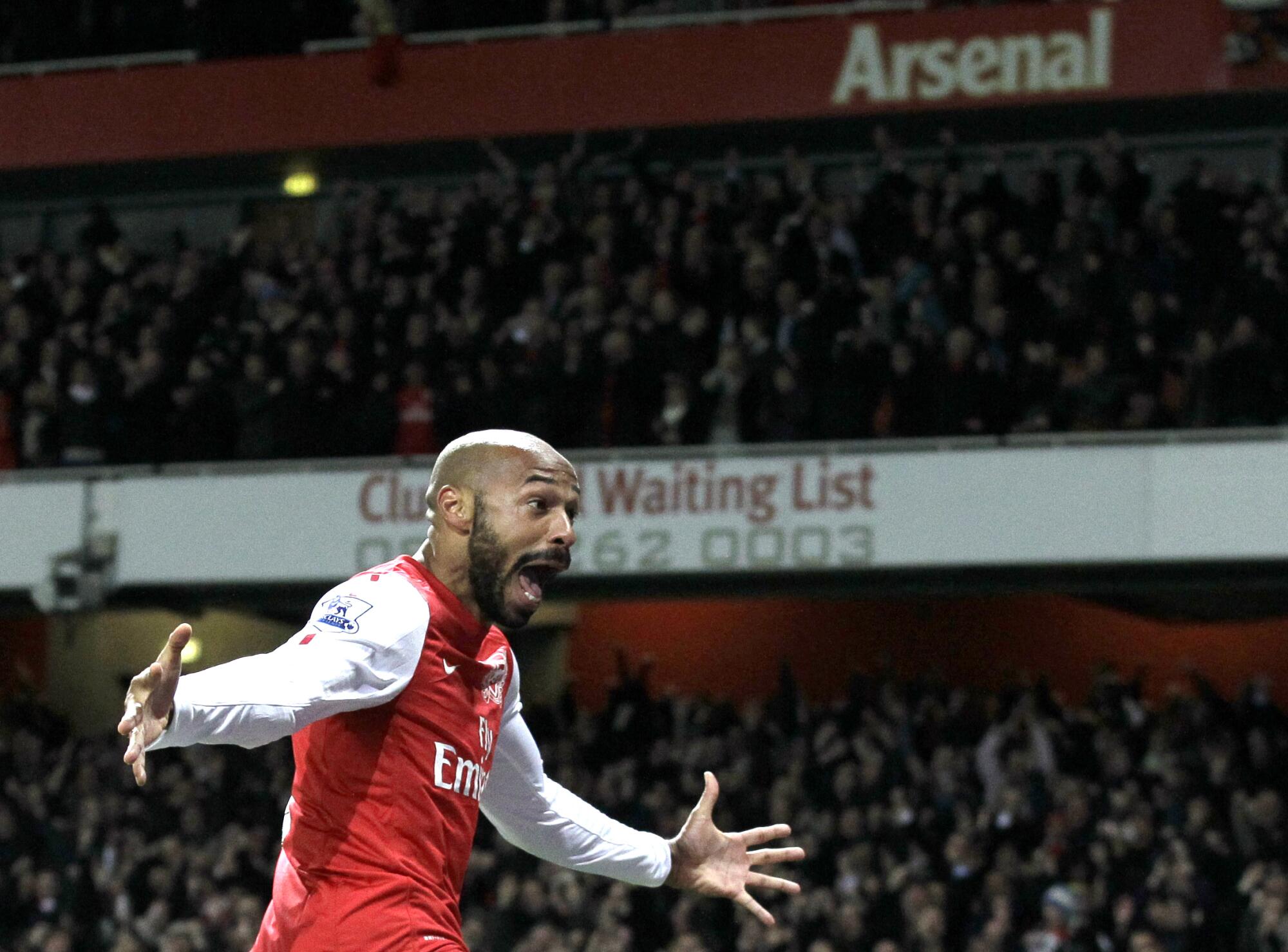
For so many people, here in Europe and across the pond, Thierry was the epitome of football excellency, a transcendent star who could dance or delight on the pitch, in a way that seemed to entertain even the gods.
“Not a lot of people know that, but I was an Arsenal fan growing up,” Richards said. “It was the team I could relate to the most. Patrick Viera and Thierry Henry were heroes of mine. When I met [Thierry], it was my debut for Manchester City. I was only 17. And it was against Arsenal, a team I loved so much … I just see Thierry, in all of his stature, his aura and demeanor. I was in awe, starstruck. Everything about him was so cooooool. After the game, he signed me a shirt saying, ‘to Micah, keep up the good work.’
“I’ve still got that shirt framed to this day.”
Abdo mentioned that Thierry had a weird effect on people when he played, that it was hard to hate him no matter what he did to your team. “As a defender,” Carragher told me, “you’d be fearful playing amongst him. [Arsenal] was the best team I played against in England.”
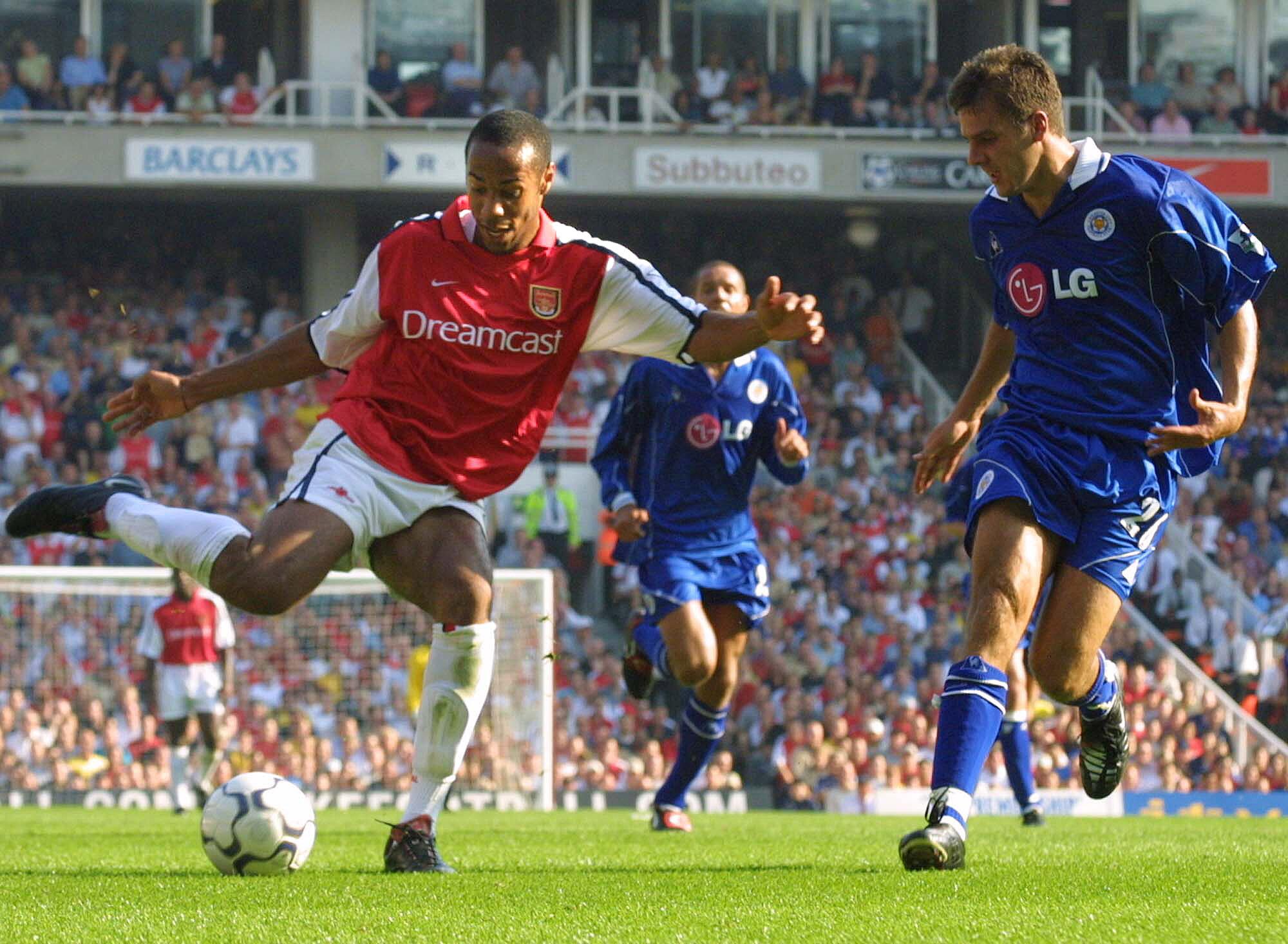
But what made a man, a captain of a rough generation at Liverpool, so fearful of the man known as Titi?
“He was so fast! That’s what it was,” he said. “It wasn’t just that, but he had the ability to go with it. Ability with the ball, he was powerful and just the blistering pace. I mean, I don’t think I ever played against anyone that quick before, really. There’s a lot of quick players in football, but Thierry Henry felt like another level. He was like an Olympic sprinter. That’s what it felt like you were goin’ up against. It was like, errmmm. “Like playin’ against Usain Bolt, but Usain Bolt was [actually] good at football.”
As I sat across from Thierry, he seemed so far removed from the glory the game gave him. I could see it in his eyes. He wanted back in.
Hell, he needed back in.
After retirement, Thierry tried his hand as a manager. First, with Arsenal’s youth teams before graduating to an assistant job — twice — under Roberto Martínez for Belgium’s international side. Players across Europe’s top leagues started to tell the press that Thierry had talent, so much that his advice was helping them turn more chances into goals.
He got his chance at Monaco and in Montreal, but flamed out both times for different reasons. In Monaco, he got the boot after 20 games. “I can only be thankful for what Monaco did for me,” he said. “There were a lot of reasons why it didn’t work, including me [as manager].”
Monaco had 17 injured players during Henry’s tenure. Most of his starters were teenagers, and they were competing against Champions League sides whenever they weren’t fighting in the basement of France’s Ligue 1. Monaco got rid of Thierry before his first crack at the winter transfer market and brought back the manager it sacked before him.
“That was very difficult,” he said, noting his replacement benefited from his work. He added, other coaches were treated differently. When Carlo Ancelotti couldn’t make Everton go as a manager, he didn’t find it hard to get another job. When Arteta finished eighth on the table his first year, Arsenal didn’t get rid of him. Steven Gerrard pushed Aston Villa three places lower on the table in his first year and kept his gig. Thierry wondered why he wasn’t afforded the same grace.
“Was I also young and had to learn? Obviously I had to learn,” Henry said. “But, how do you learn without learning?”
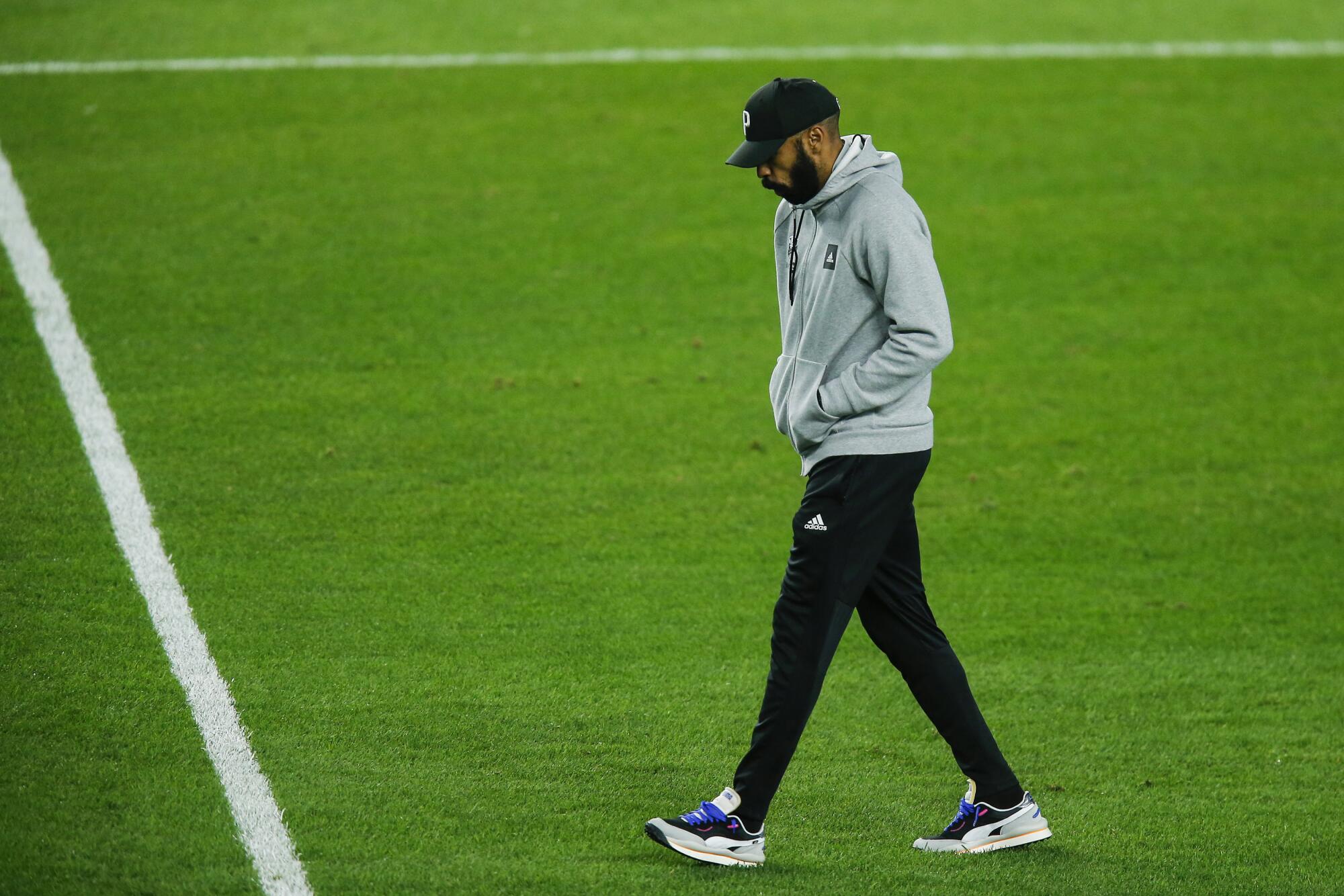
In Montreal, after leading the club to its first playoff appearance in four seasons, he stepped down to be closer to his kids and moved to London. “Not seeing my kids was impossible,” he said. “I left. I love football, I love competing beyond anything! But, no. No. I didn’t see my family for a year, man. I had to go back. Simple as that. I’m not ashamed about it, nothing. I’m proud, actually. It was the first time I felt like I actually did something for myself.”
Since then, there have been whispers all around the game about what he would do next, all while he appeared on television, showing every week how prepared he was to take a job. Thierry says he turned down a chance to coach the French women’s national team, telling me he felt like he wasn’t qualified for the role. “Can I learn in [the role,] yes,” he said. “But, it wouldn’t have been fair to anybody.”
CBS hasn’t been shy about its advocacy for Thierry, either.
Three months before I met Thierry in London, Abdo surprised him on set (at the prodding of producers), asking Thierry if he’d “put his name in the hat” to coach the United States men’s national team. And Carragher recently pressed Thierry on set, in Milan, about his U.S. candidacy. There was months of buzz linking him to an open job, but nothing set in stone.
A report commissioned by U.S. Soccer cleared Gregg Berhalter of any infractions and highlighted more interference by Gio Reyna’s parents.
Thierry maintained that he hasn’t been cagey about what he wants to do next. He says he wants to be a manager again. To prove that he was fit for it — to himself, and the rest of the world that might be doubting him. He wasn’t looking for a handout, he said, just trying to earn his way back in. The only problem was his phone hasn’t been ringing. He didn’t want to be pessimistic, but it was hard to keep the stray thoughts out of his mind. The idea that he would coach again was slipping away from him. “If I don’t invite you to my party,” he says, matter of factly, “then, you can’t come.” He started to grimace. “I can’t put it better than that.
“I’ve only heard stuff. And I know how people can see it. They don’t try to know what happened,” he said of his past. “People don’t care.”
Laced with years of rejection already staring him in the face, he took a job as an assistant with Belgium for the second time, winning a bronze medal in the World Cup.
“Roberto Martínez, I will always have mad respect for him,” Thierry said. “He gave me a hand when he didn’t have to. I had no affiliation with him. Nothing. Yet, he was the only one who gave me an opportunity to coach.”
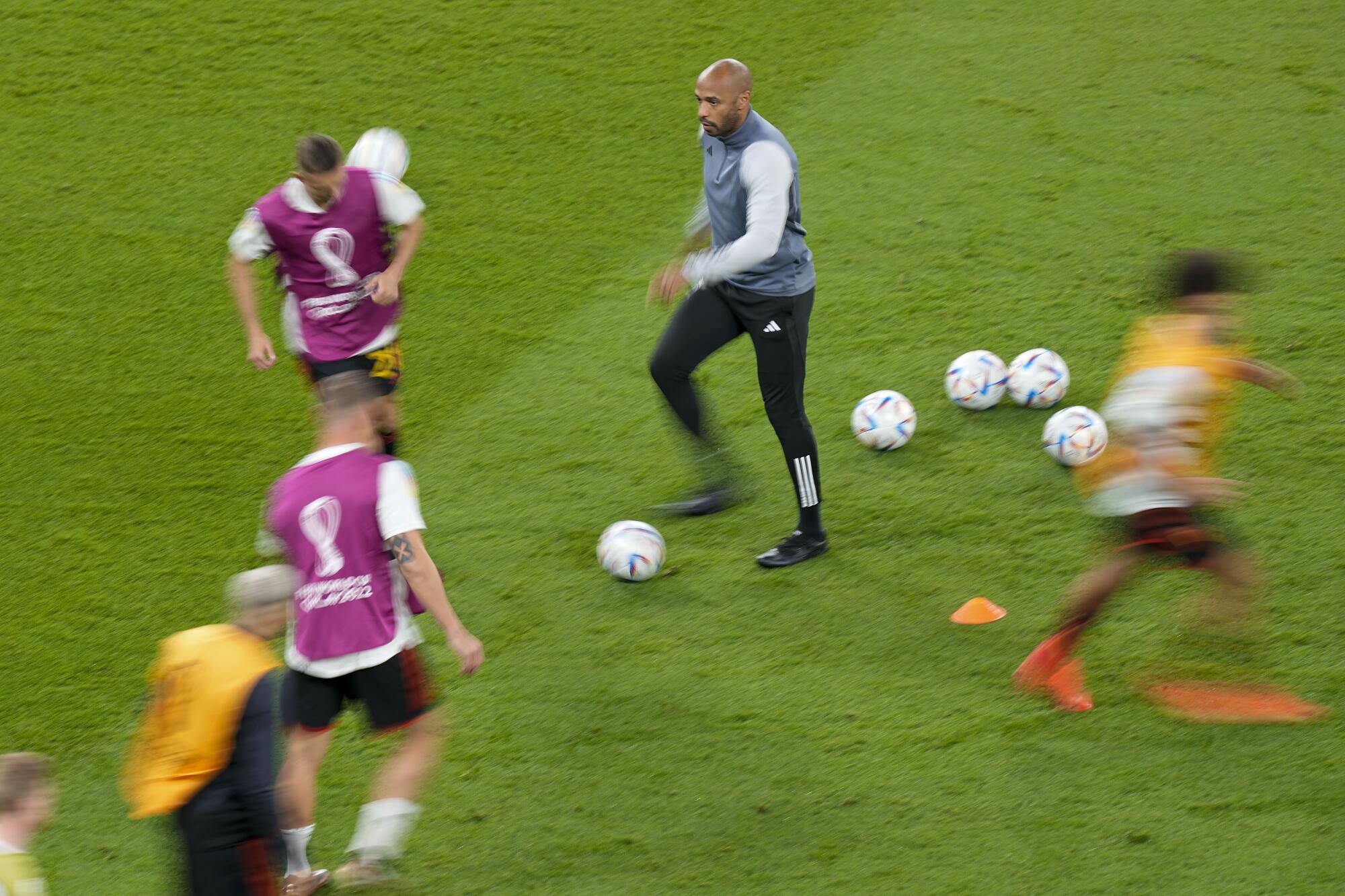
The time away made him adamant that he had a place in the world’s best leagues, coaching their brightest players. But, he wouldn’t accept less than he felt he was worth. “If you do your due diligence,” he said, “you will see that I am not a diva. I know what I can do if given time. … I don’t have any explanation, basically [why I’m not coaching]. “Apart from the obvious one. And I hope it’s not that.”
It wasn’t a ridiculous thought. Out of 44 jobs at the top two levels of the English football pyramid, only four jobs were held by Black men (Vincent Kompany at Burnley; Darren Moore at Sheffield Wednesday, Liam Rosenior at Hull City and Valerien Ismael at Watford). Thierry wasn’t afraid to question what he thought was wrong. His mindset, that staunch ethos that taught him to never back down, can be traced to the way his parents raised him in a small apartment in the Parisian suburbs four decades ago.
“If I ask you a question now, when you look at the football field — the field, on the field, the two teams — what do you see? You see diversity. You see people coming from any background, any religion. But,” he said, his voice spiking, “when you turn the camera around, what do you see? When!!” he slaps his hands together. “When you turn the camera around to the bench or behind the ball, what do you see?! You don’t see diversity, however you want to call it. You do not see di-versity. I would advise you to count how many coaches you see from different ethnicities coaching in the big leagues.”
His coffee finally arrived, it was time for him to go back on set.
He promptly sat back up and tried to be more discreet about his nudity the second time while stepping back into his suit.
Before opening the door, he made sure I caught exactly what he said.
“Am I stating facts or am I making up stories?” he asked. “I always say, to be able to win or lose the race, you have to be in it. So, can I be in? Can I be looked at? Can I be part of the discussion? Can we be part of the discussion? … The rotation is always the same. I don’t mind you having a lap on me or two or three or four or five or six or 10! You didn’t grow up the same way I did … but can I be in the race? Can I lose the race? Even if you have a head start, I’m not hating on you. I just want to know, can I run forward?
“Can I even win? Can I fail again?” he whispered, his face slowly changing from optimism to pessimism. He left the room, his words heavy, staying in the air behind him long gone.
I just couldn’t tell if he was speaking to me, or himself.
Thierry was born in Les Ulis, a suburb outside of Paris, to Antoine and Maryse, in les quartiers difficiles. He described it as a rough, Creole upbringing. He joked that he was friends with the roaches. “I knew their name, they knew my name,” he said, laughing. “Swear down.” Maryse was born in Martinique and Antoine in Guadeloupe. Both left their homelands to become migrants in France. Maryse was a cleaner for years before becoming a concierge in a university town. Antoine bounced between gigs, once he was a greeter at a grocery store, another time he worked security. They were poor, working-class Black folks. “I always say to people, I didn’t know,” Thierry said of economic standing. “I was happy. I didn’t need a lot to be happy, because I couldn’t compare it to anything else. So,” he sighed, “they were the best days of my life.” But, soon, he found out how different he was.
He believed his life was golden, even if Antoine was pushing him, every day, to follow in the footsteps of his hero Marco van Basten and punish his opposition on the pitch.
Antoine was stifling, forcing 7-year-old Thierry to practice tackling drills on Antoine at full speed in the cracked lots around Les Ulis to prepare his baby body for the future. When Thierry finally relented, it was clear he had talent for the sport, even if Antoine was hanging on his shoulder.
Maybe his father wouldn’t stop because he saw how talented Thierry’s brother, Willy, was. Willy was forced to play on a segregated club team limited only to Black and Arab children. There was an emphasis on not being noticed, on taking off their hoodies, on speaking Creole or Verlan. If he didn’t fit in, he’d bring problems to his family.
“You know, Caribbean dads,” he said. “It was about, ‘Don’t shame the family.’ No one could ever know what was happening at home. Instead of walking with your chest out, you don’t want to be noticed. It wasn’t always easy to spread my wings.”
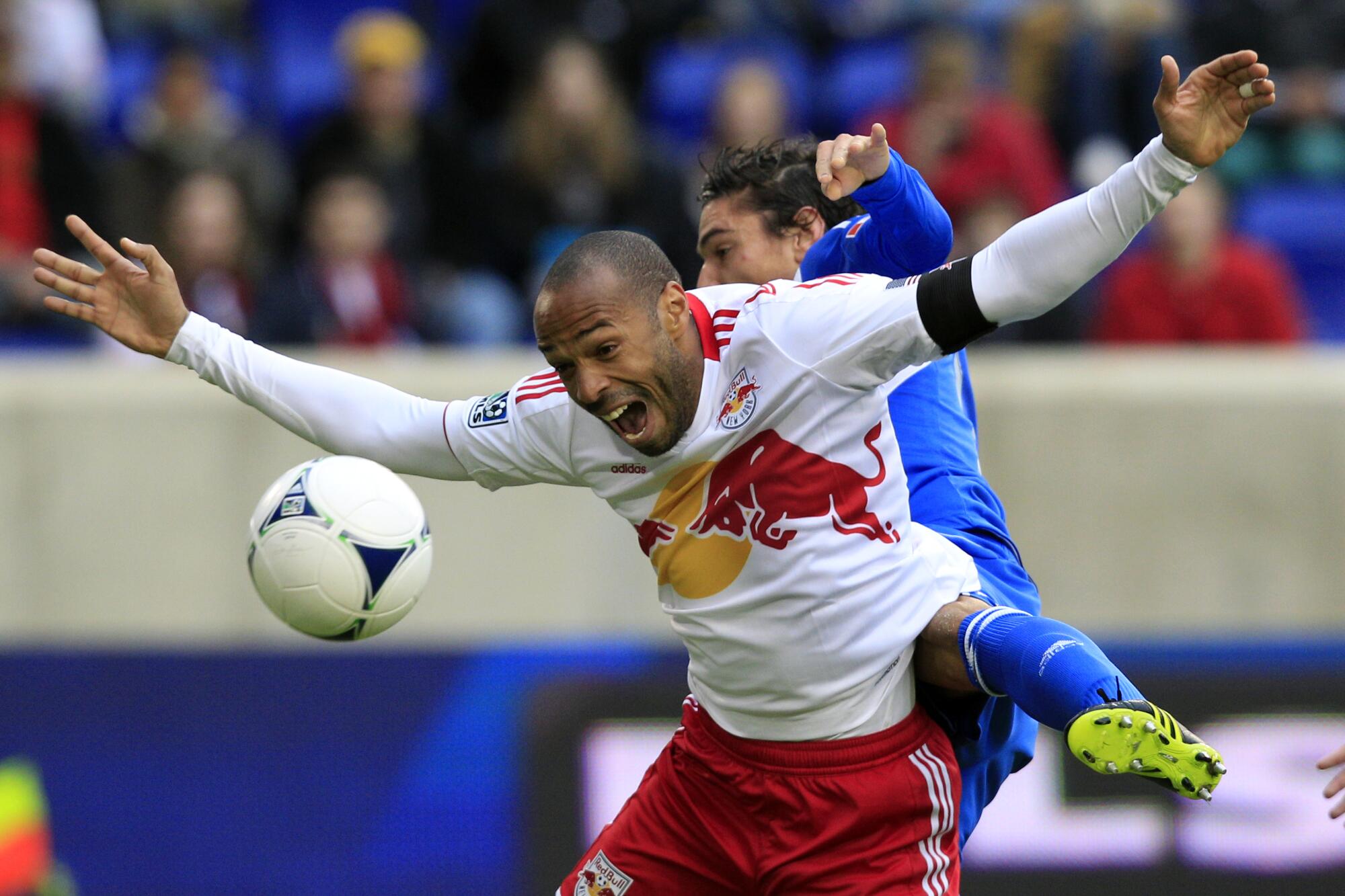
For anyone’s estimation, football was their ticket out, as long as Thierry could buy into a sport he was never naturally drawn to. Antoine and Maryse eventually divorced, so football became an easy way for Thierry to spend time with his father. And his father’s criticism became fuel for him to rise into a champion. Anything that got Antoine to show him some affection.
By the time Thierry was 11 years old, Antoine was so determined to see his son excel, he was fired from his security job for missing the start of his shift by two hours. Where was he? Driving his boy to a game.
“I was just trying to make my dad happy,” Thierry said. “It’s a cliche, but your dad is your first hero. You want to get that approval, that little wink that you did well, son. The hardest thing I’ve ever had to do in my life was put a smile on my dad’s face. I was never trying to build an identity, I was trying to make him happy.”
It took Thierry years, past the teams of wonder for France and Arsenal and long after his playing career was over to fix that part of himself, to reconnect his present to the broken child he left behind long ago. The man he became was a legend, loved from London to Les Ulis and back. But, he says, it corroded a part of him he never got back.
“I have played the game [professionally] since I was 17,” he said. “I never paused. It was just game, game, game.”
Soccer superstar Lionel Messi is poised to join David Beckham’s MLS team Inter Miami, marking the biggest transaction in league history.
Some sides of ourselves are easier to accept than others. He was whipped into football supremacy, and it was keeping him paid well past his prime, but that same blessing was a curse for Thierry. The vault of striking secrets that his co-workers herald also was a prison. All of the games he watched reminded him how he could never go back. And his job as an analyst, no matter how beloved he’s become since taking over for Roberto Martínez on the CBS set, wasn’t feeding his insatiability. His obsessiveness with greatness. His unending hunt for perfection.
“Make my dad happy, make my teammates happy, make the fans happy,” he said. “Along the way you forget yourself. You do. You forget yourself. What about your own happiness? That is why a lot of times athletes when they stop, they struggle. … You are programmed all the time to please people, but what about you? What about yourself?
“At one point, whether I was aware of it or not, I tried to give people what I didn’t have,” he said. “My happiness and my sadness was always through people. Always. And the game only enhanced that.” At one point, he said, he started to believe crying was a weakness, that being vulnerable was a sin. “It’s tough when you want to open yourself and there’s no empathy,” he said. “What happens then? You close yourself off forever.”
The one thing Thierry said he learned during these years of self-examination was that failure was the first step toward perfection. He used to be a title-hungry athlete, who learned to love the sport and focused only on winning. But, now, he felt resigned, unable to understand how the losses were racking up. “I kind of thought for a very long time that I understood empathy and vulnerability after my career. I thought titles were the most important thing, but I soon realized it was actually how you transcend people … I didn’t understand the journey until later.”
In some ways, time away from the game helped. It started in Montreal, where he was locked behind doors in Quebec without his family, learning how to deal with himself.
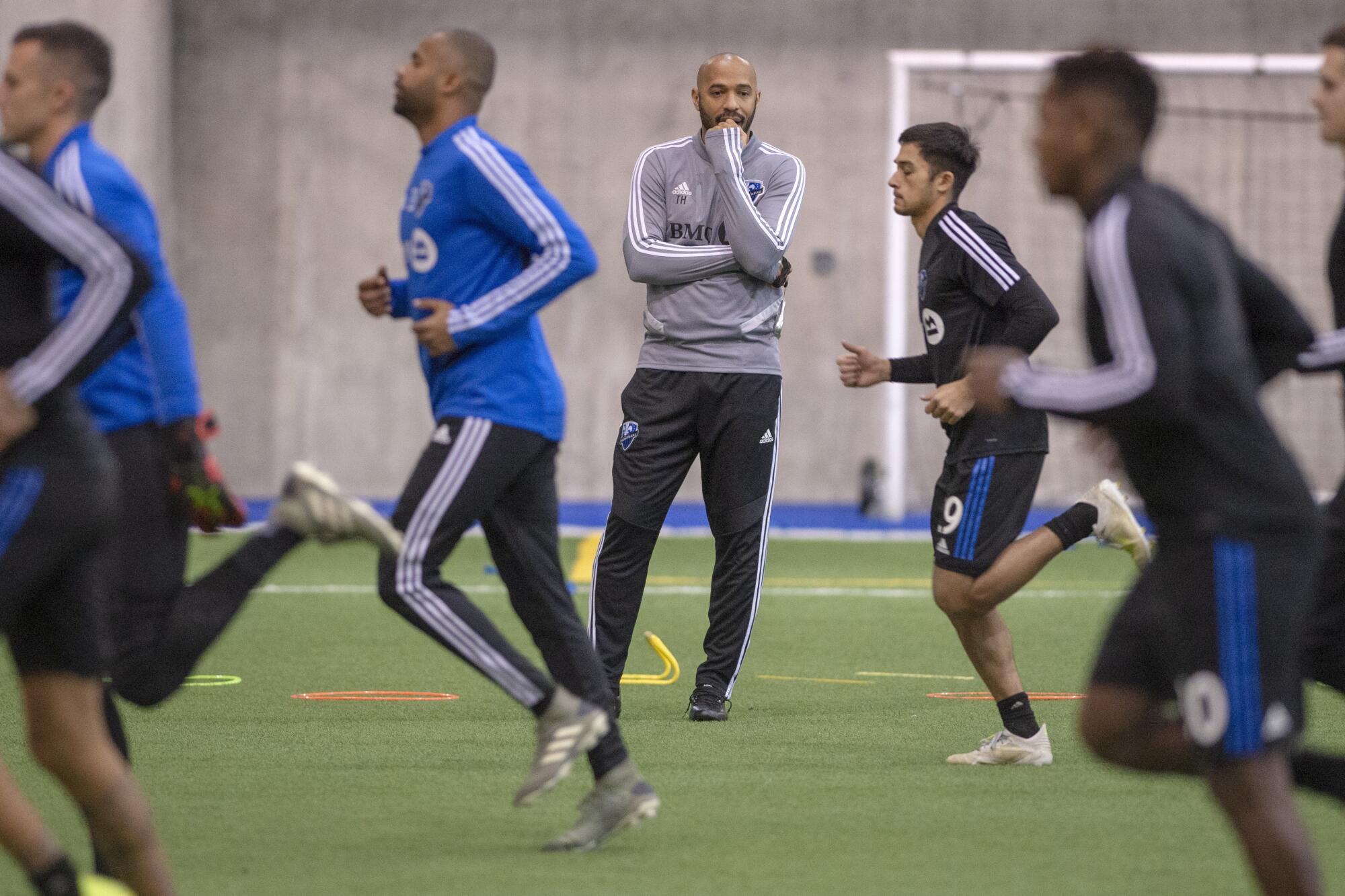
He was stuck. He just wanted to figure out who he was now, at this age, without anyone to help him. There was a moment when he thought, maybe, he needed help. “Help was like, something is wrong with me. It must be,” he said. “Being vulnerable was a weakness, as a youngster and in football. So many times people asked me, ‘Did I go through depression?’ Hmmm,” he thought. “I don’t know. I don’t know the signals. I must have. But my life was just games, games, games and going through [the motions.]” He said he didn’t realize sometimes when he was hit on the pitch, he didn’t even feel it.
There were years he realized he didn’t really know how to show or receive love, that he didn’t even know how to say “I love you.” He couldn’t even give someone a proper hug. His arms receded on impact. He sweated at the thought. “I didn’t have that in my programming,” he said. “I’m not ashamed to say it. I just didn’t have it. I just pretended. It was a lot of pretending.” He was still trying to make his father proud, puff his chest out, never showing any weakness.
When he lost games, he’d snap at his teammates, furious they couldn’t see — as he did — that they were going to lose. He kept finding himself annoyed, week after week. Whether he was willing to say it then, he was afraid of losing everything he worked so hard to build. “I wasn’t the right guy to be around,” he said. “I was demanding so much of everything, of everyone, at any time and every moment.” And even worse, some days in the dressing room, “I wasn’t even a satisfied guy when we won.”
It was a hard reality for him to reconcile, because football, he says, made him who he was. But, if he was ever going to move forward, something had to change. If he ever wanted to manage a team again, players needed to know they weren’t letting him down by not meeting his lofty standards. So, it’s no coincidence that his new favorite word recently has been “empathy.” He thinks it’s vital, these days, to leading the next generation. “If you asked me six years ago, what [qualities] a leader needs to have, I would have said, ‘He has to be a killer,’” Thierry said. “Now, I would tell you that he needs to show that he is vulnerable.”
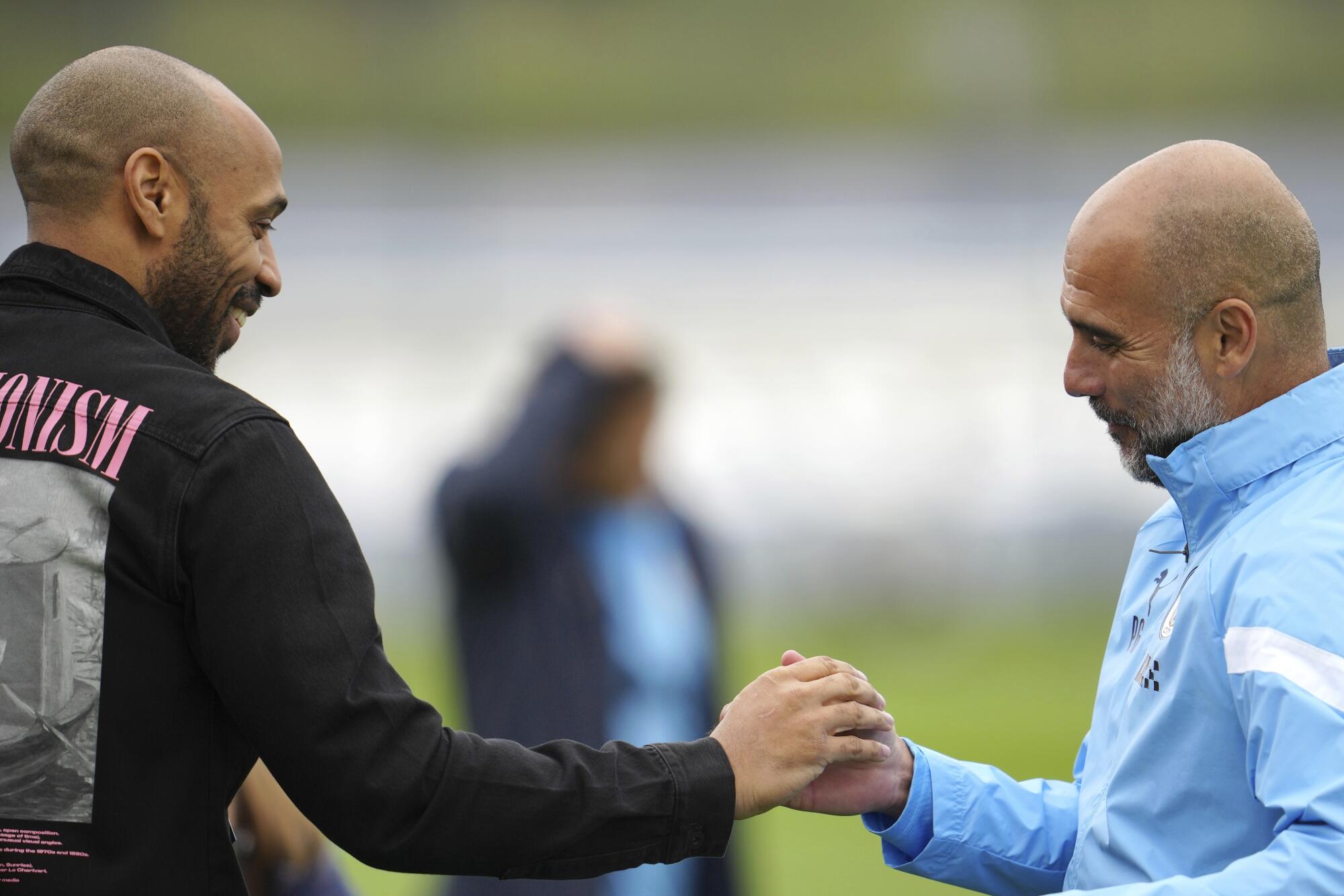
He said he found that he wasn’t able to relate to younger players. His strict training methods weren’t making him any friends in the dressing room. When he failed, he went back to his structure, to his father’s education that turned him into a phenom in the Premier League. But what was set in stone for him, has cracked and broken. Right or wrong, he could no longer be the coach caught in viral clips from training sessions yelling at players. “You can’t bring that,” he said of the generational differences. “It doesn’t exist anymore.
“... That was OK then. It’s not OK now,” he admitted. “If you don’t speak to them, well, you lose the dressing room. And, at the end of the day, who is going to go? The coach. They’re not going to fire the whole team.”
At that moment, someone knocked on the door.
It was showtime.
Thierry pulled up his tie and headed toward the door, ready to dazzle the world, just as he did any weeknight the camera was on. He was the same man on the CBS cameras as he was on the field, to us watching at home: endearing, ebullient and esoteric — perpetually drawing on the world-class expertise that made many fans fall in love with the feisty Frenchman. And how couldn’t you? He was Titi, after all. The man-made exception to every football rule that binded Black kids around the world, an unyielding representative of The Beautiful Game beloved from Birmingham to Battersea. In fact, eventually, his success became ours, too. We bragged about the bad man in boardrooms and barbershops. He provided the purest dose of freedom, self-made, as mighty as a planet with a magnetism that made us all gravitate toward his orbit. “A lot of men want to maintain a hardcore appearance,” Abdo told me. Instead, though, Thierry is “willing to be vulnerable. He’s willing to show emotion. In male professional sports? That’s a rarity.”
“To me, the American equivalent was Kobe Bryant. In terms of the cult of popularity and being a pop-culture icon. Thierry has that. You can be a really famous footballer, and never cross over in that way to the culture. And, I think he does. It’s certainly refreshing.”
— CBS Sports host Kate Abdo
When Thierry was a child, Antoine said his grandmother never read a lot of books, but she would come up with a hell of a saying. The moment he finds himself now, on the cusp of a future in managing, or staring at a future in the broadcast booth, reminded him of something she told him years ago.
“Time often brings what the moment refuses,” he told me.
I asked him, how could he show the rest of the world that he wasn’t the man of the past, that he was finally prepared to lead a team to glory. He refused to give an answer, to bind himself to one reality or the other, to predetermine what his successful path could be instead of living presently.
“Look I cannot compare myself to nobody,” he said. “I’m nobody right now as a coach, like I was a nobody when I started playing football. But, you need another chance and you need another chance and you need another chance.”
